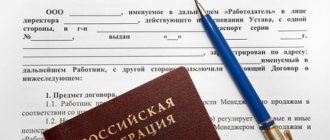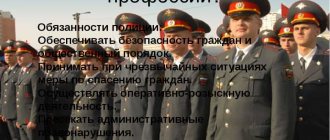Assaulting a police officer is a great way to ruin your life for anywhere from 360 hours to 20 years. And in especially severe cases - forever, because life imprisonment can hardly be called a pleasant life. And even if you did not use force, but simply “sent away” a law enforcement officer out of emotion, this will not end well for you.
But, as they say, everyone is strong in hindsight. If, after all, you recklessly attacked a police officer, you cannot do without legal help.
As practice shows, courts rarely treat those who have violated the honor, life and health of their colleagues leniently. So hiring a good lawyer is the first thing you should do.
Do you want to figure it out, but don’t have time to read the article? Lawyers will help
Entrust the task to professionals. Lawyers will complete the order at the cost you specify
27 lawyers on RTIGER.com can help with this issue
Solve the issue >
When is a police officer “on duty”?
Sometimes after an incident, friends and relatives reassure the attacker: “Come on, he was not on duty, nothing will happen to you.”
Firstly, this is not true, if only because for an attack on any person there will be punishment in any case. Secondly, most people think that “on duty” means in uniform, with weapons, during working hours, etc. But this is also not entirely true. Therefore, it would not be superfluous to clarify the term.
In Art. 68 part 3 of Federal Law No. 342-FZ “On service in the internal affairs bodies of the Russian Federation and amendments to certain legislative acts of the Russian Federation” dated November 30, 2011 states that an employee is on duty if:
- stops crime;
- protects people whose life and health are in danger, and at the same time they cannot defend themselves;
- acts in the interests of protecting the state and society.
And it doesn’t matter whether he has a weapon on him, whether he’s in uniform, at work or not, and what time of day it is. It doesn't even matter if you have an ID. If an employee of the Ministry of Internal Affairs (MVD) fulfills his duty, he is on duty.
If there is a fight at the entrance and a policeman in home clothes comes out to stop the noise, and he is attacked, at that moment he is on duty. So the article will be appropriate.
If at the same time he presented his identification, and the violator ignored or decided that “the crust is fake,” then “Disobedience to a lawful order of a police officer” will be added to the main article. This is already a violation of Art. 19.3 of the Code of Administrative Offenses of the Russian Federation (CAO RF).
But employees of the Ministry of Internal Affairs are considered to be performing official duties in other cases:
- on the way to work or medical examination and back home;
- while in hospital after an injury received in service;
- when participating in competitions, training camps, etc.;
- if they were held hostage.
Exception: if the attack is committed on an employee of the Ministry of Internal Affairs who is on vacation when he is not performing his immediate duties. But, you must admit that this is also not a reason for insults and fights.
Article 317. Encroachment on the life of a law enforcement officer
- home
- Laws and regulations
- Criminal Code of the Russian Federation
- Article 317. Encroachment on the life of a law enforcement officer
Encroachment on the life of a law enforcement officer, military personnel, as well as their relatives in order to impede the legitimate activities of these persons to protect public order and ensure public safety, or out of revenge for such activities -
is punishable by imprisonment for a term of twelve to twenty years with restriction of freedom for a term up to two years, or life imprisonment, or the death penalty.
Commentary on Article 317
Main object
crime is a normal activity of law enforcement. An additional object is the life of a law enforcement officer, military personnel, as well as their loved ones.
This crime is two-part.
In contrast to the corpus delicti provided for in Art. 295 of the Criminal Code of the Russian Federation, the norm in question ensures the protection of the lives of the above-mentioned subjects not in connection with the activities of administering justice or preliminary investigation, but in connection with the activities of protecting public order and ensuring public safety.
Law enforcement agencies in relation to Art. 317 of the Criminal Code of the Russian Federation are the Ministry of Internal Affairs, security agencies, penal systems, etc.
Military service is a special type of federal public service performed by citizens in the Armed Forces of the Russian Federation, as well as in the internal troops of the Ministry of Internal Affairs of the Russian Federation, in the civil defense forces, engineering, technical and road construction military formations under the federal executive authorities, the Service foreign intelligence of the Russian Federation, bodies of the Federal Security Service, federal body of special communications and information, federal bodies of state security, federal body for ensuring mobilization training of government bodies of the Russian Federation, military units of the federal fire service and special formations created for wartime, as well as foreign citizens in the Armed Forces of the Russian Federation, other troops, military formations and bodies.
Citizens (foreign citizens) undergoing military service are military personnel and have the status established by Federal Law of March 28, 1998 N 53-FZ “On Military Duty and Military Service” <1>.
———————————
<1> Northwestern Russian Federation. 1998. N 13. Art. 1475.
The concept of close persons is considered in relation to the corpus delicti under Art. 105 of the Criminal Code of the Russian Federation.
Objective side
crime under Art. 317 of the Criminal Code of the Russian Federation, is expressed in active actions aimed at depriving the life of a law enforcement officer, military personnel, as well as their loved ones.
Responsibility under Art. 317 of the Criminal Code of the Russian Federation occurs if an encroachment on the lives of the persons named therein was carried out in order to impede activities to protect public order and ensure public safety or out of revenge for such activities.
Activities to protect public order involve the prevention, suppression and detection of offenses committed in public places that violate the rights and legitimate interests of an indefinitely large number of persons. Ensuring public safety consists of protecting the vital interests of the individual, society and the state from external and internal threats (for example, ensuring air safety, suppressing riots, preventing acts of terrorism, providing assistance to victims of natural disasters, etc.).
Encroachment on the life of any of the persons listed in Art. 317 of the Criminal Code of the Russian Federation, not related to this activity, should be qualified as a crime against the person.
In the theory of criminal law, an attempt on life is understood as murder or attempted murder <1>.
———————————
<1> See: Resolution of the Plenum of the Supreme Court of the USSR of September 22, 1989 N 9 “On the application by courts of legislation on liability for attacks on the life, health and dignity of police officers, people's vigilantes, as well as military personnel in connection with the performance of their duties protection of public order" // SPS "ConsultantPlus".
An attack on the life of persons listed in the article in question of the Criminal Code of the Russian Federation, as well as their loved ones, must be qualified under Art. 317 of the Criminal Code of the Russian Federation, regardless of whether the death was caused to the victim or did not occur due to reasons independent of the will of the perpetrator. According to the design of the objective side, this crime is truncated. The crime is considered over
at the time of an encroachment on the life of a person specified in the disposition of the article in question, therefore, when qualifying such actions, a reference to Art. 30 of the Criminal Code of the Russian Federation (attempted crime) is not required. At the same time, the fact of causing death does not require additional qualification under paragraph “b” of Part 2 of Art. 105 of the Criminal Code of the Russian Federation, since this crime is a special corpus delicti of murder under aggravating circumstances.
Subjective side
The crime in question is characterized by an intentional form of guilt.
With a direct legislative indication of the purpose of the crime, the subjective side is expressed in the form of direct intent
, i.e. when the actions of the perpetrator indicate that he foresaw the onset of death and desired it.
Mandatory features of the subjective side of a crime are the purpose of the crime (obstruction of the legitimate activities of these persons to protect public order and ensure public safety - the desire to stop, change such activities now or in the future) or motive (revenge for such activities - for actions already performed).
Subject
a crime may be committed by a sane person who has reached the age of sixteen (general subject). If an attack on the above persons was carried out by minors aged from fourteen to sixteen years, then it must be qualified under paragraph “b” of Part 2 of Art. 105 of the Criminal Code of the Russian Federation.
Law protecting the police
Police work is dangerous and involves health risks. It is rare for offenders to voluntarily surrender to law enforcement agencies. But even if not arrested, there is always the possibility of an attack from the outside. Therefore, there are certain articles in the Criminal Code of the Russian Federation (CC RF) that provide penalties for such actions:
- Parts 1 and 2 Art. 318 of the Criminal Code of the Russian Federation establishes liability for the use of force against police officers.
- Art. 317 of the Criminal Code of the Russian Federation threatens those who encroach on the lives of law enforcement officers, members of their families and loved ones.
Close people include not only immediate relatives. These may be someone who means a lot to the victim, such as a close friend, loved one or mentor.
Also under this article are those who violate the privacy of a police officer and his family. By the way, you can also get a real sentence for this.
Art. 319 of the Criminal Code of the Russian Federation provides for punishment for public insult. In addition, they can be punished for slander (Article 298.1 of the Criminal Code of the Russian Federation) and false denunciation of a representative of law enforcement agencies (Article 306 of the Criminal Code of the Russian Federation). And the punishment will be much harsher than if the victim is an ordinary citizen.
Punishment for beating, attacking a police officer
The Criminal Code of the Russian Federation provides a number of rules for offenses against police officers:
- Under Article 319, a citizen who publicly insults a police officer while on duty will be punished. Such an action is punishable by a fine of up to 40 thousand rubles or correctional labor for up to a year.
- Article 318 provides sanctions for causing bodily harm to a law enforcement officer. Punishment is determined by the severity of the injuries.
- Article 317 – attempted murder of a police officer. Encroachment on life while performing the duties of a police officer for the protection of law and order or out of revenge is punishable by imprisonment from 12 to 20 years or life imprisonment if the police officer died. The article also prescribes the death penalty, but Russia has imposed a moratorium on this type of punishment. The provisions of the article apply if family members of a police officer have suffered at the hands of criminals for the same reasons.
Responsibility depending on the severity of the crime
As in all other criminal cases, the punishment is chosen primarily based on the severity of the crime, and then the court takes into account other factors. But it is the nature of the harm caused that plays a decisive role.
Threats and harm to health
If violent actions were committed against a police officer or his relatives, but did not threaten life and health, a case is opened under Part 1 of Art. 318 of the Criminal Code of the Russian Federation. And this also includes threats to commit such actions. For this, the offender may face:
- fine up to 200 thousand rubles. or in the amount of income for 18 months;
- arrest for six months;
- forced labor for up to 5 years;
- imprisonment for up to 5 years.
But in the case of an attack on a police officer causing harm to health, the crime is already qualified under Part 2 of Art. 318 of the Criminal Code of the Russian Federation. The harm can be minor: bites, cuts, abrasions, etc. And it can be serious - if it has significant consequences for the victim.
Moreover, even if timely medical assistance was provided, this does not change the essence. There is practically no chance of receiving a suspended sentence for such an act, except in cases where the harm was minor. The severity of the injuries is determined by a medical examination. The attacker could be sentenced to 10 years in prison.
There is a statute of limitations under Article 318. If this is a crime of moderate gravity, then 5 years, if serious - 10 years.
Threat to life
When a policeman performs his duty, and he or his loved ones are attacked, encroaching on his life, we are talking about Art. 317 of the Criminal Code of the Russian Federation. This carries a very severe penalty - from 12 to 20 years in prison (and 2 years of restriction of freedom) or even life imprisonment.
There are often attacks on a convoy, which is qualified under Part 2 of Art. 105 and part 3 of Art. 30 of the Criminal Code of the Russian Federation and faces 8–20 years in prison. If at the same time the escort escaped - 8 years of imprisonment or 5 years of correctional labor (Part 3 of Article 313 of the Criminal Code of the Russian Federation).
For an assault with theft of weapons and ammunition during an escort, you can receive a sentence of 8–15 years with a fine and restriction of freedom (Part 4 of Article 226 of the Criminal Code of the Russian Federation).
Slander and false denunciation
We can say that these are lighter crimes. But when it comes to employees of the Ministry of Internal Affairs, even in such cases one cannot “get away with it.” Slander is dangerous not only against police officers, but also against judges, investigators, bailiffs and prosecutors.
If we are talking about ordinary citizens, a case is opened under Art. 128.1 of the Criminal Code of the Russian Federation. But slander against law enforcement officers is Art. 298.1 of the Criminal Code of the Russian Federation. The punishment may be as follows:
- fine up to 5 million rubles.
- a fine in the amount of the convicted person’s income for 3 years;
- corrective labor for 480 hours.
For knowingly false denunciation, according to Art. 306 of the Criminal Code of the Russian Federation, you can receive a sentence of up to 6 years or be sent to correctional labor for up to 5 years. So you need to be careful with words.
Second commentary to Art. 317 of the Criminal Code of the Russian Federation
1. The objective side of this crime includes both murder and attempted murder of a law enforcement officer, military personnel, as well as their relatives.
2. A law enforcement officer is a citizen of the Russian Federation who, in accordance with the procedure established by federal law, performs the following duties:
1) prosecutor;
2) investigator;
3) the person conducting the inquiry;
4) a person carrying out operational investigative activities;
5) an employee of internal affairs bodies who protects public order and ensures public safety, executes sentences, rulings and decisions of courts (judges) in criminal cases, decisions of investigative bodies and prosecutors;
6) an employee of the federal security service;
7) an employee of the authorities for control over the circulation of narcotic drugs and psychotropic substances;
bailiff;
9) an employee of federal state security bodies, as well as other duties in bodies for which the protection of law and order is the main or one of the main tasks (Article 2 of the Law of March 22, 1995 No. 45-FZ “On State Protection of Judges, Law Enforcement Officials and Controlling Officials” organs").
A military personnel is a citizen of the Russian Federation serving in the Armed Forces of the Russian Federation, other troops, foreign intelligence agencies and federal security agencies.
Close persons - close relatives of the victim, other persons who are related to him or her, as well as persons whose life, health and well-being are known to be dear to the victim due to established personal relationships.
3. The subjective side of this crime is characterized by direct intent and purpose: to prevent the victim from carrying out his activities or the motive is to avenge it. Personal motives and goals of encroachment on the life of a law enforcement officer, military personnel (or their loved ones), such as hostility, resentment (etc.), arising on domestic, family and even official grounds (for example, envy), require qualification of the act as a crime against the individual.
4. The subject of this crime is a person who has reached the age of 16 years.
5. When an attack on the life of a statesman or public figure is committed in order to terminate his state or political activities or out of revenge for such activities, the act is qualified under Article 277 of the Criminal Code of the Russian Federation.
6. An attack on the life of a person carrying out justice or a preliminary investigation, a law enforcement officer, committed by means of an explosion, arson or other actions of a similar nature in order to impede their legal activities or out of revenge for such activities, is qualified accordingly under Article 295 or Article 317 of the Criminal Code ( Clause 12 of the Resolution of the Plenum of the Supreme Court of the Russian Federation dated 02/09/2012 No. 1 (as amended on 11/03/2016) “On some issues of judicial practice in criminal cases involving crimes of a terrorist nature”).
What to do if a police officer is beaten by a group of people?
In our society it is often said that the police are unable to protect citizens from beatings on the streets. This is only partly true, because sometimes criminals exert physical influence on people in uniform, and not acting individually, but in entire groups.
Beating a police officer is qualified under Part 1 of Art. 318 of the Criminal Code of the Russian Federation. The instructions on what an employee should do after such actions are no different from the guidelines for ordinary citizens:
- Contact a medical facility and record the fact of the beating.
- Write a statement about the group beating and take a referral for a forensic examination.
- Undergo a medical examination and determine the severity of the injuries inflicted (mild, moderate or severe harm to health).
- Start collecting evidence (DVR recording, photos, audio materials, witness statements).
As a rule, attacks on police officers are carried out by unknown persons. It is rare for an employee to know the attackers or know where to find them. This is especially true in cases of group beatings.
In the event of an attack on a police officer, the security service and the prosecutor's office become involved in the case. This is explained quite simply: beating people called upon to protect the safety of citizens should be punished to the fullest extent of the law, regardless of the identity and status of the attackers.
Author of the article
Dmitry Leonov
Work experience 15 years, specialization - housing, family, inheritance, land, criminal cases.
Author's rating
721
Articles written
712
about the author
Useful information on criminal cases
- What to do if your husband beat you?
- Beating up a policeman
- The procedure for removing beatings
- Article for beating a minor child
- Causing minor harm to health
- Statement of battery - sample
- Husband threatens physical harm and murder
- If a person threatens violence, what to do?
- Where to go if a child is beaten at school
- How to write a statement to the police about beating
- Causing grievous bodily harm
- Expertise of beatings
- Criminal liability for kidnapping
- Assault by a group of persons
- Exceeding permissible self-defense - article
- Injury at work: what should an employee do?
- Punishment for beatings
- Limits of Necessary Defense
- Unintentional injury to health
- Infliction of moderate bodily harm
What is the penalty for beating a police officer while on duty?
What a court will award for assaulting a police officer depends on the severity of the crime, the circumstances, and the totality of events. There are several punishments for encroaching on the life of an internal affairs officer and his relatives:
- imprisonment from 12 to 20 years;
- life imprisonment;
- death penalty (currently there is a moratorium).
In case of threats, fights without serious consequences for health, beatings and aggression with violence in other forms, 2 subcategories of punishment are provided.
If the attack, beating and other actions did not pose a threat to the life of the policeman and his family members, then as a punishment the court may impose:
- fine up to 200 thousand rubles;
- forced labor for up to 18 months;
- arrest for 6 months;
- imprisonment for up to 5 years.
In case of beating and assault on a police officer, resulting in danger to life, the punishment increases to imprisonment for up to 10 years.
In case of a group fight, the court takes into account aggravating circumstances, with the exception of minors. Punishment can be proportionate for each offender.
Investigation into the case of beating a police officer
The Investigative Committee of the Russian Federation is investigating the case of an attack on a police officer. The police are only collecting primary material on the case, explanatory notes, evidence, etc. The main investigative and procedural actions are assigned to employees of the RF IC.
What influences the court's decision when beating a police officer:
- mitigating circumstances - age, marital status, state of passion, etc.;
- aggravating events and circumstances - group fight, serious harm to health, drug/alcohol intoxication, preparation for the crime, conspiracy, etc.
There are a number of things to consider when charging:
- a properly constructed defense will reduce the punishment to a suspended sentence, a peace treaty or a suspended sentence;
- inflicting minor bodily harm on a police officer on vacation is not equivalent to an act under the above articles of the Criminal Code of the Russian Federation;
- if guilty, the case may be considered in a special manner, which provides for a punishment of no more than ⅔ of the maximum for the incriminated acts;
- The case can be closed at the trial stage if the parties reconcile.
Note!
When considering the beating of a police officer in a special manner, it is impossible to appeal the court decision to a higher authority.
Punishment and term
Penalty provided by law for an attempt on the life of a police officer during execution is imprisonment for up to 2 years or life, depending on the severity of the criminal offense committed. A longer term is assigned for the murder of a police officer, a shorter one for causing harm to health or a failed assassination attempt.
An important point in punishment is the corporate solidarity of all those working in the police. She plays an important role in solving crimes against “friends”, because another employee can always take the place of the victim. Coordinated at different levels, a close-knit team can neutralize and punish a criminal in the shortest possible time.
The life of a policeman is a link through which infringement is caused to damage public order and security. In order to understand this issue in detail, or to obtain legal assistance in criminal prosecution for an attack on the life of a police officer, call the numbers listed on the website or contact online.







